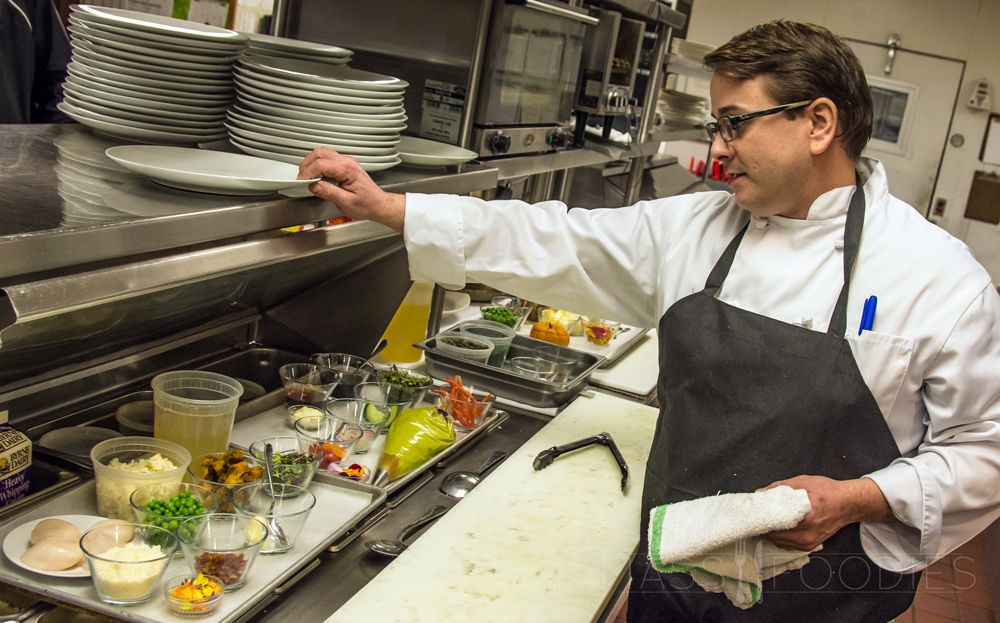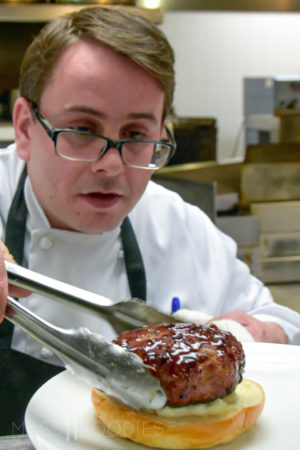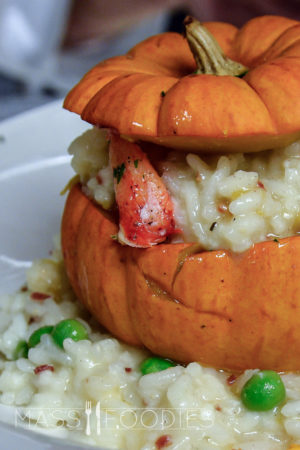
In The Making of a Chef, Michael Ruhlman writes about some tasty potatoes he ate in New Orleans. The potatoes were nothing fancy. No tricky techniques or proprietary ingredients – just exquisite texture and taste: “The chef hadn’t used the potato as a basis for displaying flashy, flamboyant skills but had placed his skills in the service of the potato.”
Nearly twenty years after reading that line, I find myself standing in the Mezé Greek Tapas kitchen and watching as Giannoula “Yiana” Kaneloglou pulls a single yellow wedge of piping hot potato-ey goodness from her tray of Greek Lemon Potatoes and places it in a tiny white dish. She hands it to me. I break it open, and it releases a breath of steam thick with lemon, salt, oregano, and extra virgin olive oil. I bite through the crusty herbs on top into the flaky yellow flesh, and I understand what Ruhlman meant. I know the secret. Which is to say there is no secret. Just Yiana’s skills in the service of the potato… and really all the authentic Greek ingredients and dishes she and her husband Nikolaos “Niko” Georgiadis have made in the Mezé kitchen since it opened in 2014.
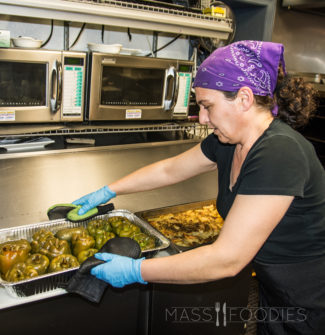
“I do the cooking, he works the grill. We each have our own staffs. But all the difficulty is mine. If it is simple, it is his,” Yiana says with a smile.
Mezé is owned by their cousin, Sotirios “Sam” Georgiadis, who wanted to create a Greek restaurant that was authentic and decidedly not Americanized, which perfectly describes Yiana and Niko. Both speak and understand English but not fluently and when the conversation gets animated around food they speak quickly and passionately in Greek. And neither had a connection to any Americanized Greek food. For the ten years before they came to America, they owned a restaurant in Greece, drawing on the recipes Yiana learned and adapted from the women in her family and Niko’s. That bed of chopped lettuce and tasteless hunk of feta dusted with oregano that often passes for a Greek salad in the United States? It’s definitely not Greek to them.
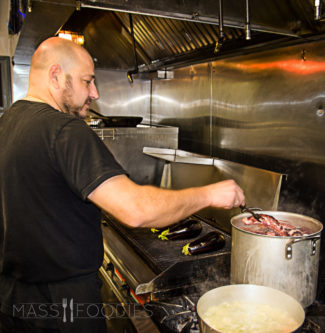
Certainly nothing like the Greek fare they turned out in their restaurant in their hometown, Hrisohorafa Serron in the northern part of the country. Many of the dishes at Mezé are reflective of that region, especially the Bou-you-rdi (feta cheese in a clay pot with tomatoes, hot peppers, and Greek oregano topped with mozzarella cheese) – an unusual and appealing dish with Turkish origins. In fact, the word mezé itself is of Turkish origin and is a way of eating small dishes, most of which look like what Americans might think of as appetizers. The idea is to taste and share it all, like Spanish tapas: one spoonful, one piece for each person around the table – never too much – just enough to try the different flavors from the garden, land, and sea between sips of wine, ouzo, or another beverage that complements the food. Maybe one big dish comes at the end but is served family style too. No greater compliment to Yiana and Niko than forks and hands flying and shouts of “στην υγειά μας” (stin-iyia-mas) – “to your health”!
There is a Greek expression for this way of eating: metron ariston, which translates to “nothing in excess” or “moderation is best” and it is Yiana’s first rule of cooking too: nothing in excess: “I like balance and to be balanced between the food but also the herbs and the flavors and the aromas. In one dish there might be five herbs and I don’t want one of them to overpower the other. Everything flavors everything.”
“What we try and do is make it balanced so everyone can try and enjoy,” adds Niko. “Everybody can find a way in. No ingredient and no person’s needs or wants to stand out from the other. They carry each other and work with each other. That’s balance.”
Yiana and Niko still find balance with each other. “Okay, it’s not fun,” Yianna smiles. “Working together?” They both laugh. “When someone says after a long day, ‘Go sit with your husband at the bar. I’ll finish up.’ I say, ‘We are married for twenty years and have been working together for fifteen years every night. Why are you telling me to go and sit with him?’ Enough already!”
This balance is so much a part of everything they cook, Yiana can smell when things are off: “I like to smell the food. For me food is aroma. I care less about how it looks than how it smells. I never taste the food. I open up the oven or pot and I inhale and I know if it needs more salt or Niko forgot to add this.” Niko nods: When it smells right, she knows how it will taste.
And what smells and flavors! Sure, there are gateway dishes for the timid like souvlaki, a fine biftekia (pork and beef burger), and ridiculously good fried calamari. But find that feta cheese dish. Or maybe octapodi (grilled octopus on a bed of red onions). Or a whole grilled Mediterranean Sea Bream (Yiana’s favorite dish of Niko’s though he hates cleaning it) which Sam flies in fresh from Greece every Tuesday and Thursday. These are the dishes they love to share and want their customers to enjoy.
“We are happy with what we are doing,” Niko says. “People are showing that they enjoy it but more people need to know about it. That’s the only sad part. They need to explore more. When they try, they are amazed. That’s why we recommend not altering or substituting anything.” For instance, customers will get fried calamari but should branch out to stuffed or grilled versions. “They don’t get it. They’ll tell the waitress it smells like fish. But of course, what don’t you understand? It’s a fish,” says Yiana. Their son says he is just as perplexed when he sees his friends pick apart the gyros, which come with the whole meal – fries included – inside the pita. That’s the point: convenience and a little taste of each ingredient at the same time.

But still Yiana and Niko push ahead, adding dishes to the seemingly endless menu choices as customer palates expand and products become available. Niko shows off a plate of perfectly fried mussels that will soon graduate from their bar debut to table. That traditional dish of pork, sour cabbage, rice, and beans may stay a staff meal for now but one hopes it finds its way onto the menu soon. Other dishes need more than just time: “There are so many things we want to put on the menu but we’ve got to find the products first,” Sam says. “We could change the menu every six months but we can’t. It’s one thing to explain new dishes to the customers. It is another thing to make sure that the dish is exactly the way we want to be.” Yiana adds, “We don’t serve food to the customers if we don’t like to eat the food. We cook and share food from our homes and hearts.”
“We had a restaurant for ten years in Greece, but I have enjoyed it here more,” Yiana continues. “I get more thank yous here. People appreciate it more and when they find out I am the chef they come and tell me how much they love it. Two couples from England were in and they asked about us because they said the food here was better than Greece. Hey!”

Not that it has been easy to achieve that level of authenticity. “It was very difficult for us to find the ingredients with the right flavors for the food,” Yiana says. “We were so disappointed before we opened. We tested all the food and wondered what did we do wrong?” Turned out, it was a question of authenticity, right down to the salt, which Sam arranged to bring in from Greece along with oregano, feta cheese, yogurt, olive oil, and more. “It took six months after we opened to find exactly what we needed to make this a real taste of Greece,” Sam adds.
Share and do it from the heart: that is quintessential Greek authenticity right there. When Greeks see people eating by themselves, they feel sad so they invite them to the table. This generous spirit is known as philoxenia or “friendship to a foreigner” and extends to anyone who comes in off the street.
Which is exactly what happened during my visit as we piled into the bar to eat before the restaurant opened. Suddenly I’m in my own version of My Big Fat Greek Wedding with Niko and Yiana’s son and Sam’s sons and a staff that seems like family picking and digging in. Niko tells me a customer brought him a lamb to stuff and shows me a picture of the result. He pours me Haraki a brand of tsikoudia or raki that drinks like grappa. I’m not half through it when Niko refills my glass. “This is philoxenia,” Niko says. Yes, yes it is.

